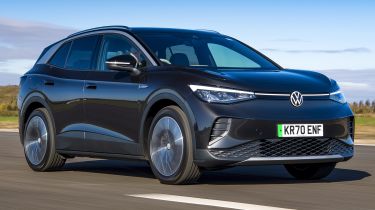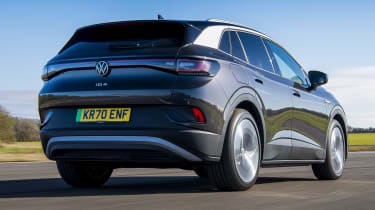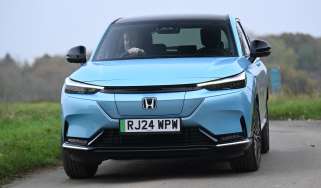Volkswagen ID.4 review
The Volkswagen ID.4 will appeal to EV buyers with a focus on family practicality and a decent range

The Volkswagen ID.4 won’t set pulses racing, but that’s not really the point of the German brand’s family-sized all-electric SUV. The second ID-badged model follows in the footsteps of the more compact ID.3 hatchback, offering more usable space and good levels of on-board tech, while a comfortable ride and practical range make it a car that’s easy to live with.
The ID.4 is not without fault, though. It’s not the most engaging drive, and if you take a look inside, you’ll notice some of the trim is a little cheaper-looking than you might expect compared with its closest rivals. The touch-sensitive controls can be frustrating to use, especially when you're on the move. Overall, the Volkswagen ID.4 is a good, but not class-leading, all-electric family car.
About the Volkswagen ID.4
Volkswagen is facing up to an all-electric future with a steady rollout of zero-tailpipe emission cars under its ID sub-brand. The Volkswagen ID.3 hatchback was the first model to ride on the VW Group’s MEB platform, which was designed to help implement the company’s strategy of nearly 100 per cent EV sales by 2040. The versatile EV-specific architecture also serves as the underpinnings for the Volkswagen ID.5 coupe-SUV and Volkswagen ID. Buzz minibus, as well as the Audi Q4 e-tron and Cupra Born.
Being an electric family SUV, the ID.4 has plenty of rivals. It goes up against the accomplished Ford Mustang Mach-E and the talented Korean duo of the Hyundai Ioniq 5 and Kia EV6, while the Nissan Ariya (our 2022 Car of the Year) is an appealing choice in this segment. The Tesla Model Y is another very popular option, plus there’s even close competition from within the VW Group stable with the Skoda Enyaq.
Used - available now
The ID.4 comes with either a 52kWh or 77kWh battery (both the useable capacity numbers), with most versions featuring a single motor driving the rear wheels. Models with the smallest battery and least powerful 168bhp electric motor are badged as Match Pure, and start at just under £43,000. This model has the lowest range at 224 miles.
Next up is the larger 77kWh battery pack offered in Match Pro models. This version costs a little under £44,500 and still uses a rear-mounted electric motor, but it has more power, up to 282bhp and 535Nm of torque. This version has the most driving range, at 336 miles.
Buyers seeking the reassurance of all-wheel drive will no doubt look to either the dual-motor Pro 4Motion (with up to 324 miles of range) or the 335bhp ID.4 GTX (with 317 miles of range). These models start from around £46,000 and £54,000, respectively.
The trim choices have altered dramatically since the ID.4 was introduced. Entry-level Match Pure models come with 18-inch steel wheels, LED headlights, a 10-inch infotainment touchscreen with Apple CarPlay and Android Auto connectivity, keyless go, heated front seats, a wireless smartphone charger and a reversing camera.
Upgrade to Match Pro, and aside from the larger battery pack and more powerful electric motor, you get 19-inch alloy wheels, Matrix LED headlights with adaptive high-beam assistance, and an electric tailgate. The top-of-the-range GTX adds 20-inch alloy wheels, a head-up display, a panoramic glass roof, and three-zone climate control.
















